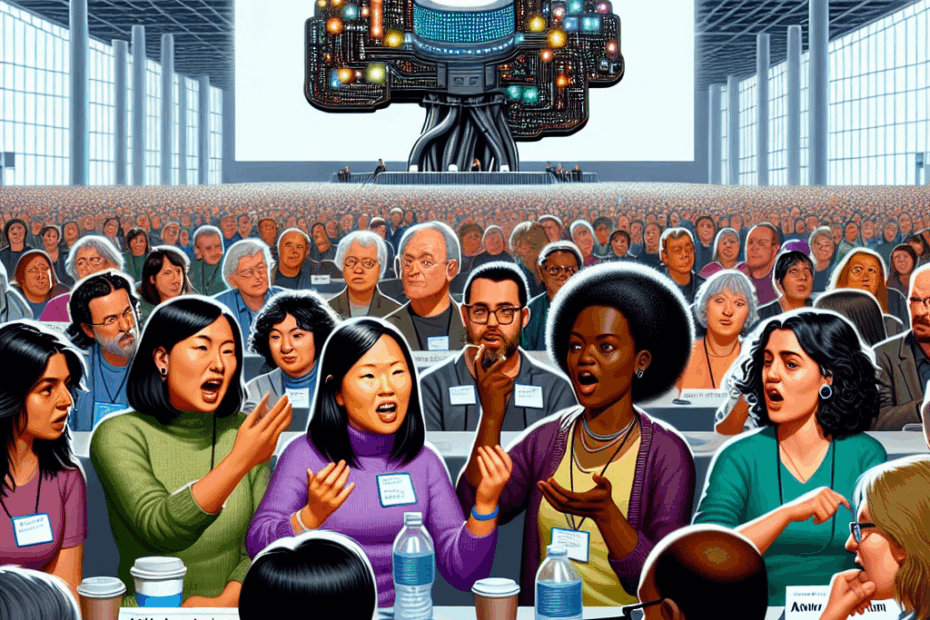“`html
Sci-Fi Convention Uses AI, Authors Not Happy!
Hey everyone, John here! Today we’re diving into a bit of a sci-fi showdown, but it’s happening in the real world. It seems a big science fiction convention tried using AI to help pick panelists, and some authors are not thrilled about it. Let’s break it down.
The Idea: AI to the Rescue?
So, the organizers of this Worldcon (that’s short for World Science Fiction Convention) thought they could use AI to streamline the process of choosing who gets to be on the panels. Imagine trying to sort through tons of applications – it’s a lot of work! The idea was that the AI could quickly scan through submissions and help identify the best candidates.
Lila: John, what does “streamline” mean? It sounds like a fancy word!
John: Good question, Lila! “Streamline” just means to make something more efficient or simpler. Think of it like making a car more aerodynamic – it helps it move faster with less resistance.
The Problem: Authors Cry Foul!
Here’s where things get interesting. Some authors are not happy about this at all. One author, David D. Levine, wasn’t shy about expressing his displeasure. He even referred to the AI as a “planet-destroying plagiarism machine!” That’s some strong language!
Lila: What’s “plagiarism?”
John: Plagiarism is when you take someone else’s work or ideas and pretend they’re your own. It’s like copying your friend’s homework and turning it in as your own. In this case, the author is worried that the AI might be used to unfairly compare authors or even steal their ideas. A pretty scary thought.
Why the Backlash?
So, why all the fuss? Here are a few reasons why authors might be concerned:
- Fear of Bias: AI algorithms are trained on data. If that data is biased (meaning it unfairly favors certain groups over others), the AI might make unfair decisions. Think of it like teaching a dog tricks – if you only reward the dog for sitting, it might never learn to stand!
- Quality Concerns: Can an AI really understand the nuances of creative writing and identify the best panelists? Some authors doubt it. An AI might not be able to appreciate the creativity and originality that a human can.
- Job Security: There’s always the worry that AI could eventually replace human decision-makers, leading to fewer opportunities for authors and other creative professionals.
The Bigger Picture: AI in the Arts
This whole situation raises some important questions about the role of AI in the arts. Is AI a helpful tool that can assist humans, or is it a threat to creativity and originality?
Lila: John, what’s an “algorithm?” It sounds super complicated.
John: It’s a good question, Lila! An algorithm is just a set of instructions that a computer follows to solve a problem or complete a task. Think of it like a recipe for baking a cake. The recipe tells you exactly what ingredients to use and how to mix them together. The AI algorithm does the same thing to make the selections.
There are definitely potential benefits to using AI in the arts. It could help identify talented artists who might otherwise be overlooked. It could also free up human reviewers to focus on more complex and nuanced evaluations.
However, there are also risks. AI could reinforce existing biases and lead to a homogenization of creative expression. It’s important to proceed with caution and to ensure that AI is used in a way that supports and enhances human creativity, not replaces it.
My Thoughts
Personally, I think AI can be a useful tool, but it’s important to remember that it’s just that – a tool. It shouldn’t be used as a substitute for human judgment, especially when it comes to something as subjective as art. It all comes down to how we use it.
Lila: I agree, John! It sounds like AI could be helpful, but we need to make sure it’s fair to everyone.
This article is based on the following original source, summarized from the author’s perspective:
Top sci-fi convention gets an earful from authors after
using AI to screen panelists
“`
